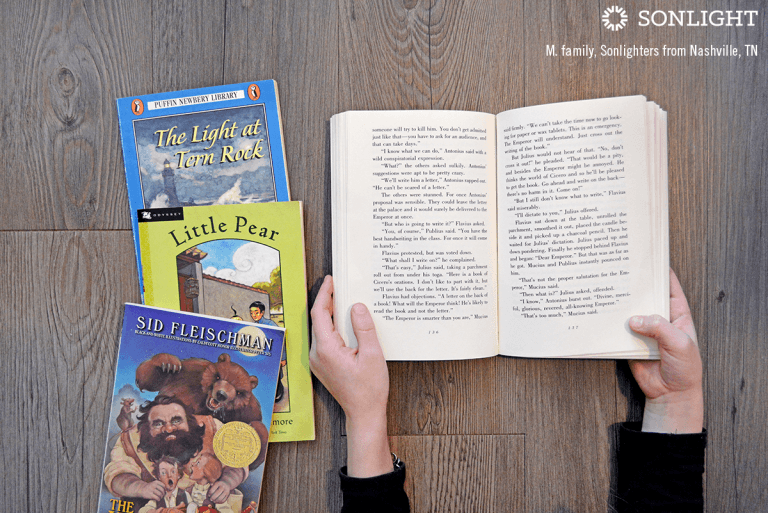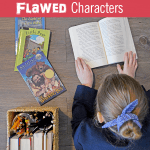
There is much focus in the homeschool culture on wholesome reading material, particularly titles which feature boys and girls of exemplary virtue. In these books, the main characters consistently—if not inexplicably—model correct choices and praiseworthy attitudes.
Such flawless characters, the argument goes, show our children how to live by presenting ideal behavior in an ideal world. In these wholesome stories, conflicts are often presented with clear and obvious distinctions between good and evil, and with plain lines between heroes and villains.
As charming as it might sound, idyllic literature doesn’t always send a positive message.
I’m a second-generation homeschooler who married a second-generation homeschooler, and between us, we have a whole lot of adult siblings who were educated at home, too. When I talk with my siblings and my homeschooled peers, one topic which comes up over and over again is the impact rewritten (as opposed to real world) stories had on our faith as adults. At first read, these stories of idealistic boys and girls sound harmless enough. After all, the main characters exude all fruits of the spirit and then some, and never seem to struggle with bad attitudes or poor choices. These are the heroes we want our children to model, right?
The problem, though, is that such idealistic tales take place in a vacuum very unlike the real world. The choices—and people!—our children meet in real life are rarely so black and white. Sending the message it’ll always be easy to spot what’s right and who’s right is dangerous and confusing. While there is a place for solidly moral tales, greater learning and growth comes from sharing authentic stories of flawed, human characters. It’s far more impactful to discuss with your kids how a complex character overcame in a broken world, than how a faultless character succeeded in a perfect world.
1. Flawed Characters Model the Power of Redemption
This is why I love Sonlight’s real-world approach to choosing books. Read the first qualifier on Sarita's seven-part test for a Sonlight book:
“Heroes should not be flawless. Anti-heroes ought not to be thoroughly detestable. They need to be nuanced and complex–the way real people are.”
As Christians, this is so important. God has made it a point to show us, over and over again throughout the Bible, His tremendous power to transform the flawed and the broken through the power of His grace. Jesus’ very lineage is traced through men and women undoubtedly flawed, yet fully redeemed. We aren’t meant to focus on a goal of perfect behaviour outside of Jesus; we’re meant to focus on Jesus.
In fact, many of my homeschooled peers and I would go so far as to argue that feeding our children a steady diet of unrealistically perfect literary characters, to the exclusion of other books, actually has the potential to harm our children’s faith. You see, when children are presented with a constant stream of flawless literary characters who do no wrong and face no struggles—or who overcome overly-simplistic struggles in a formulaic manner—several things are bound to occur.
2. Flawed Characters Define Goodness in the Light of Grace, but Flawless Characters Define Goodness as the Sum of Actions
First, when we focus on idealized characters, we risk sending the message that a child’s goodness is defined as the sum of their virtues and actions. While we all want our children to make right choices, we don’t want to accidentally perpetuate the false idea that worth—or salvation!—is measured by the the quantity of virtuous choices a person has made.
Worth is inherent as a being created by God; salvation is not merit-based. Flawed heroes live out the gospel, right on the pages of the books we hold in our hands. And it’s flawed heroes who show us it is in our imperfections Christ’s power can shine through. (2 Corinthians 12:9)
3. Flawed Characters Steer Us Away from the Trap of Perfectionism, but Flawless Characters Hold up Perfection as the Standard
Second, when we idolize faultless characters, we risk teaching our children to equate perfection with goodness. After all, in one-dimensional books, it is only the villains who struggle, and only the bad guys who make errors in judgement. The main characters remain unflappable and flawless, constantly making correct choices and modeling ideal behavior. These perpetual examples of unachievable perfection can lead to great discouragement in a child.
“I consistently tell [my children],” said Molly P., a fellow Sonlighter, “that there will never be a time when they do everything right. If they did everything right, they would be Jesus. ...To expect perfection of ourselves is just plain wrong.”
4. Flawed Characters Point to Jesus, but Flawless Characters Point to Our Own Efforts
Third, when we push unrealistic characters, we risk sending a confusing message about Jesus. Hannah M. was homeschooled and raised on a wide variety of books, and she doesn’t mince words about this. “Preachy books devalue Jesus by presenting the possibility we can be perfect on our own.” she says. “‘Try harder to do better,’ these books say. If you want your children to learn to condemn themselves for every tiny flaw they have—and eventually give up on Jesus, because they can never measure up to him— read books with perfect characters. But God is not about perfectionism. He is about grace, and about lending His power to our weakness. God loves us as we are; he doesn’t wait to love us until we are perfect.”
5. Flawed Characters are Actually Normal
We’re all imperfect, every last one of us! Books with flawed main characters accurately reflect not only the human experience, but also the reality of what it means to be redeemed, forgiven, and made whole.
Sonlighter Petrina K. points out that in The Light at Tern Rock from History / Bible / Literature A, little Ronnie “struggles with unforgiveness and anger,” yet we also are privileged to watch the miraculous work of redemption and grace unfold. We’d do our children a great disservice if we skipped this book because we didn’t want to read about Ronnie’s bad attitude when he faced betrayal.
“If you are concerned they will mimic the bad behavior”, says Hannah M., “My advice to parents is to read books to your kids with flawed—normal!—characters anyway, and then discuss what you read.”
If you ask me, that sounds an awful lot like the whole foundation of a Sonlight education: real parents, reading real books to real children, and living out redemption in the everyday.
To find out more about Sonlight's unmatched Read-Alouds, and our complete book-based homeschool programs, order a complimentary copy of your catalog today.









